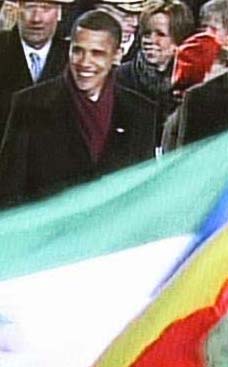
"There have been criticisms from a bunch of different directions about this bill, so let me just address a few of them. Some of the criticisms really are with the basic idea that government should intervene at all in this moment of crisis. Now, you have some people, very sincere, who philosophically just think the government has no business interfering in the marketplace. And, in fact, there are several who’ve suggested that F.D.R. was wrong to interfere back in the New Deal. They’re fighting battles that I thought were resolved a pretty long time ago." Journalist George Packer served as a Peace Corps Volunteer in Togo.
George Packer writes: The two parties are pretending to argue about the efficacy of the stimulus bill. They’re really arguing about the role of government in our society and economy, in the middle of a crisis and after decades of neglect
What the Debate Is Really About
from Interesting Times
The key lines came early in Obama’s first White House news conference last night:
There have been criticisms from a bunch of different directions about this bill, so let me just address a few of them. Some of the criticisms really are with the basic idea that government should intervene at all in this moment of crisis. Now, you have some people, very sincere, who philosophically just think the government has no business interfering in the marketplace. And, in fact, there are several who’ve suggested that F.D.R. was wrong to interfere back in the New Deal. They’re fighting battles that I thought were resolved a pretty long time ago.
No, Mr. President—far from being resolved a pretty long time ago, these battles are going to be the central ones of your Administration. There’s a basic phoniness to the whole debate over the stimulus bill. Republicans are shouting about pork and debt; Democrats are insisting on jobs and more jobs. The truth is, no one can be sure how much spending or what kind of spending will pull the economy out of its downward spiral. The other truth is, one man’s pork is another’s beef. Until the day before yesterday, Republicans had nothing against massive deficit spending. Apparently, they oppose it only when it’s aimed at real problems and real needs.
The two parties are pretending to argue about the efficacy of the stimulus bill. They’re really arguing about the role of government in our society and economy, in the middle of a crisis and after decades of neglect. They’re arguing about whether health care, education, energy, and infrastructure are necessary areas for substantial federal spending and oversight. That’s why the stakes in this argument are higher than the final price tag on the stimulus package.
The parties would have had this argument sooner or later. At its core, it’s over a basic principle that’s been the dividing line between them since Herbert Hoover was in the White House. When Eisenhower accepted the consequences of the New Deal, the argument appeared to have been settled. Reagan reopened it in 1980, and the anti-government forces held the upper hand until the past year, when the damage they’d done reached a critical level. Obama’s victory began the restoration of government to its proper and necessary role in a modern, complex society. In this sense, there’s nothing very new about the new liberalism.
When an essential political question is being debated, it’s better for everyone to know it. Obama did the country a favor last night by bringing it into the open.













